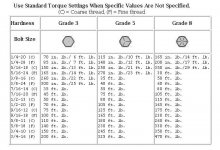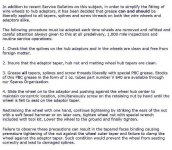Offline
This topic got worn out quickly on the Triumph Forum so I'll phrase it a bit differently (I've seen and perhaps caused my share of stripped splines and threads on wire wheels and hubs):
Should one use an impact wrench on hex spinners on wire wheels?
If so, is an impact wrench, perhaps with a torque stick, more or less accurate than whacking the spinner "tight" with a lead hammer and a wood spanner?
And finally, if one were to use a click torque wrench, what should the setting be?
Tom
Should one use an impact wrench on hex spinners on wire wheels?
If so, is an impact wrench, perhaps with a torque stick, more or less accurate than whacking the spinner "tight" with a lead hammer and a wood spanner?
And finally, if one were to use a click torque wrench, what should the setting be?
Tom

 Hi Guest!
Hi Guest!

 smilie in place of the real @
smilie in place of the real @
 Pretty Please - add it to our Events forum(s) and add to the calendar! >>
Pretty Please - add it to our Events forum(s) and add to the calendar! >> 





